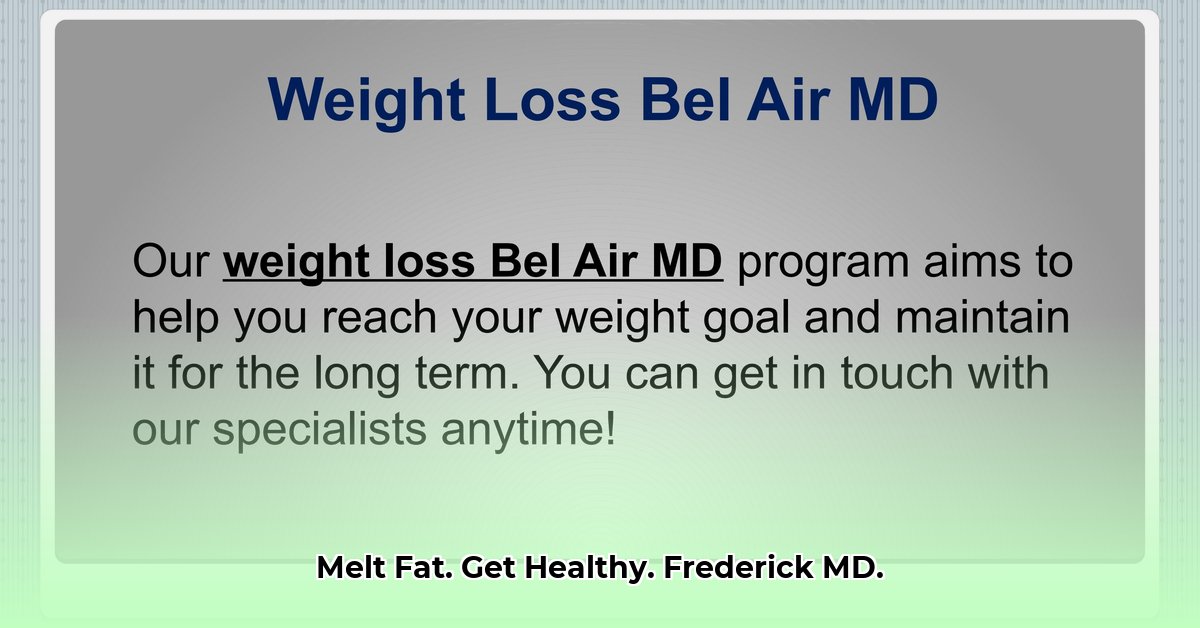
Ready to achieve your weight loss goals in Frederick, MD? Frederick Health offers medically supervised weight loss programs designed to help you lose weight safely and effectively. This detailed review and instructional guide will help you understand the various programs, their benefits and drawbacks, and the steps to enrollment. We'll also provide advice on preparation, expectations, and maintaining your weight loss long-term.
Understanding Your Options: VLCD vs. LCD
Frederick Health offers two distinct weight loss programs: a Very Low Calorie Diet (VLCD) and a Low Calorie Diet (LCD). The VLCD is a rapid weight loss program using nutritionally complete liquid meal replacements, while the LCD involves a more gradual approach incorporating healthy whole foods alongside meal replacements. Both programs are personalized to your individual needs and metabolic profile, offering comprehensive medical supervision throughout.
VLCD (Very Low Calorie Diet): A Fast Track Approach
The VLCD utilizes specially formulated, nutritionally complete liquid meal replacements to significantly reduce calorie intake, leading to rapid weight loss. While this accelerated weight loss can be highly motivating, it's crucial to understand that this is a short-term, intensive strategy requiring close medical supervision to avoid potential risks.
LCD (Low Calorie Diet): A Sustainable Solution
In contrast to the VLCD, the LCD is a more sustainable, long-term approach. This program combines healthy, whole foods with meal replacements to create a personalized calorie-controlled diet tailored to your specific needs. The focus is on establishing healthy eating habits that you can maintain beyond the program's duration.
Weighing the Pros and Cons: Is a Medically Supervised Program Right for You?
Choosing the right program depends on your individual needs and preferences. Here's a balanced look at the advantages and disadvantages of Frederick Health's medically supervised weight loss programs:
Advantages:
- Medical Supervision: Regular monitoring by healthcare professionals ensures your safety and allows for timely adjustments to your plan as needed.
- Personalized Plans: Your diet and exercise plan are tailored to your specific needs and health status, maximizing effectiveness and minimizing potential risks.
- Structured Support: Regular meetings, group sessions, and one-on-one coaching provide consistent support and guidance throughout your weight loss journey.
Disadvantages:
- Cost: Medically supervised programs require a financial investment. However, many insurance plans offer some level of coverage; it's essential to verify your benefits before enrolling.
- Referral Requirement: A physician's referral is typically necessary to ensure you're medically suitable for the program.
- Time Commitment: Participating successfully requires dedication and time commitment for appointments, meetings, and adherence to your personalized plan.
Your Step-by-Step Guide to Enrollment at Frederick Health
Ready to begin your weight loss journey? Here's a clear path to enrollment:
Physician Consultation: Schedule an appointment with your primary care physician to discuss your weight loss goals and determine if a medically supervised program is appropriate for you. Your physician will provide the necessary referral.
Insurance Verification: Contact your insurance provider to determine your coverage for medically supervised weight loss programs. Understand what's covered, any pre-authorization requirements, and your out-of-pocket costs.
Program Selection: Discuss your options with your physician and choose the program (VLCD or LCD) that best aligns with your needs, goals, and health status.
Program Registration: Complete the registration process with Frederick Health, providing all necessary information and documentation.
Program Commencement: Begin your personalized weight loss program. Attend all scheduled appointments and diligently follow your tailored plan.
Preparing for Your Weight Loss Journey and Maintaining Long-Term Success
What can you expect? Both VLCD and LCD programs involve regular weigh-ins, one-on-one consultations with healthcare professionals, and adjustments to your plan based on your progress. You might need to adjust your daily schedule to accommodate appointments and prioritize healthy food choices.
Maintaining your weight loss long-term requires dedication. Successful weight management is about building sustainable habits. This includes adopting mindful eating practices, being physically active, and seeking ongoing support. Remember, the program is a starting point--long-term success hinges on consistent healthy choices.
Understanding the Potential Risks of VLCD: A Balanced Perspective
While VLCD offers rapid weight loss, it's essential to be aware of potential risks, although these are often minimized through close medical supervision. These include nutritional deficiencies, electrolyte imbalances, and, less frequently, psychological side effects. Frederick Health's program mitigates these risks through regular monitoring and adjustments to the program as needed.
Frequently Asked Questions (FAQs)
(This section would contain FAQs based on common inquiries about the program. The FAQs should be detailed and address the concerns of prospective patients.)
Three Key Takeaways:
- Frederick Health’s medically supervised weight loss programs offer personalized support and medical oversight, but require a financial and time commitment.
- The VLCD offers rapid weight loss, while the LCD provides a more sustainable approach. The best option for you will depend on your individual health, goals and preferences.
- Long-term success demands the development of sustainable healthy habits beyond the structured program.